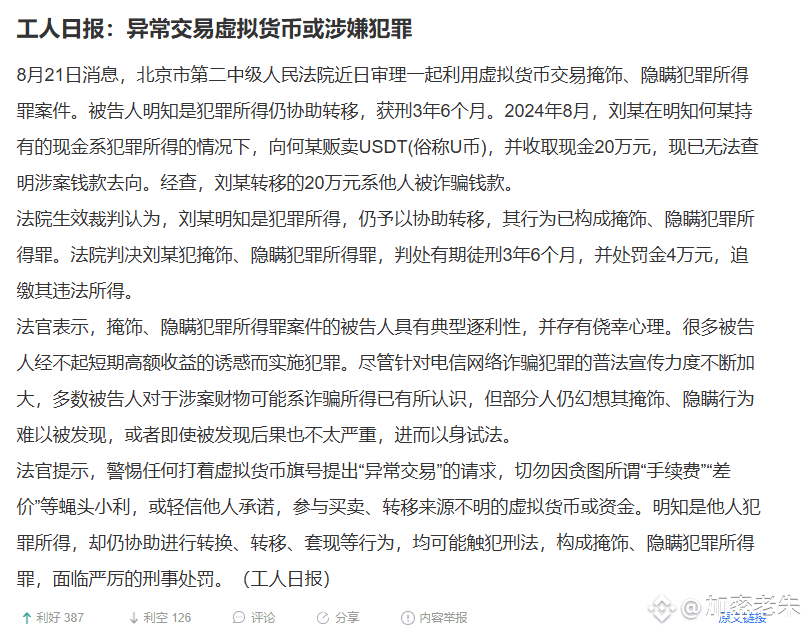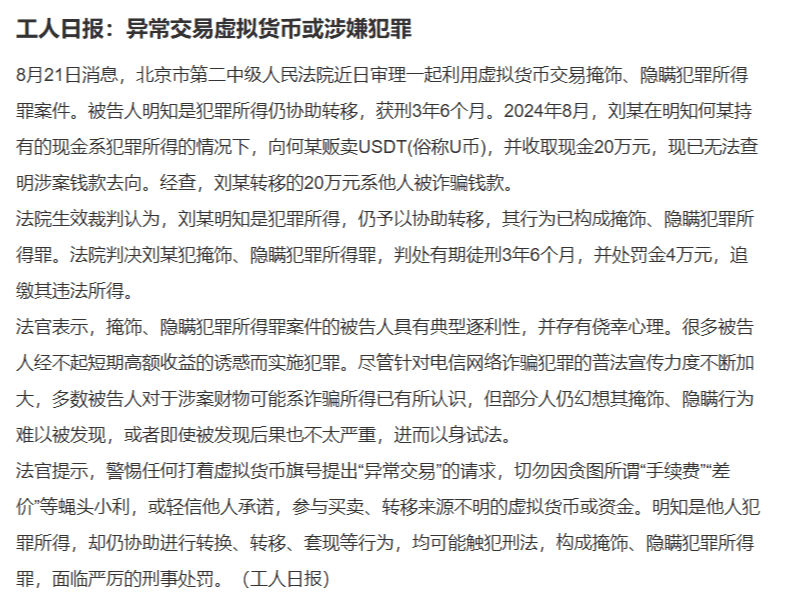Overnight, the OTC traders' circle in the cryptocurrency world exploded! A criminal judgment turned a 200,000 yuan USDT transaction into 3 and a half years of imprisonment, along with a 40,000 yuan fine.

On August 19, the Beijing Second Intermediate People's Court announced a highly significant case. Liu was sentenced to 3 years and 6 months in prison and fined 40,000 yuan for transferring criminal proceeds through USDT transactions.
This news quietly circulated in the cryptocurrency circle, but it means that the regulatory sword has ruthlessly pierced the gray areas of virtual currency trading. Any player in the cryptocurrency world who is still engaged in abnormal transactions is very likely to have stepped onto the criminal red line!
01 Case Review: The Criminal Minefield Triggered by a 200,000 USDT Transaction
In August 2024, knowing that the cash held by He was the proceeds of crime, Liu still sold USDT to He and received 200,000 yuan in cash.
These funds were later confirmed to be the money of others who were scammed, and due to their transfer via virtual currency, the flow of funds has become impossible to trace. This operational model is not uncommon in the cryptocurrency world, but now the judiciary has clearly determined: it constitutes a crime!
The court's judgment is very clear: Liu's actions constituted the crime of concealing and disguising criminal proceeds. Not only was he sentenced to 3 years and 6 months, fined 40,000 yuan, but his illegal gains were also confiscated.
02 Judge's Warning: Virtual Currency is Not a Lawless Area
The judge presiding over this case bluntly pointed out: Defendants in cases of concealing and disguising criminal proceeds typically possess a profit-seeking mentality and a sense of luck.
Many defendants succumb to the temptation of short-term high returns and commit crimes. Despite the increasing legal publicity against telecommunications network fraud, most defendants are now aware that the property involved may be derived from fraud.
However, some people still fantasize that their concealing and disguising actions are hard to discover, or that even if discovered, the consequences wouldn't be too severe, leading them to test the waters.
03 Regulatory Trends: The Era of Cryptocurrency Cleanup Has Arrived
This judgment is not an isolated case, but part of a regulatory wave. The judicial authorities have been very clear about their regulatory attitude towards virtual currency trading — any form of abnormal trading may violate criminal law.
Judges especially remind: Be wary of any requests for 'abnormal transactions' that use virtual currency as a guise, and do not be tempted by so-called 'handling fees', 'price differences', and other trivial gains.
Or easily trust others' promises, participating in the buying, selling, or transferring of virtual currencies or funds of unknown origin. Knowing that it is the proceeds of someone else's crime, yet still assisting in conversion, transfer, cashing out, etc., may violate criminal law.
04 Practical Advice: How to Avoid Criminal Risks
As a player in the cryptocurrency world, one must remain vigilant; the following points are worth remembering:
Avoid dealing with funds of unknown origin, especially when the other party requests cash transactions; remain vigilant towards abnormally high-profit transactions, as there is no such thing as a free lunch; perfect your transaction records to ensure you can prove the legal source of funds; refuse all requests to 'help transfer funds', no matter how tempting the profit may be.
The Damocles sword of regulation has fallen — this case from the Beijing Second Intermediate Court sends a clear signal to the entire cryptocurrency world: virtual currency is not a lawless area. Using USDT and other digital currencies for money laundering or transferring criminal proceeds will face severe criminal penalties.
Remember this: Any money that seems too easy to earn often comes with hidden costs! OTC's shocking thunder! Beijing courts strike hard; such trading in the cryptocurrency world may land you in prison.
Overnight, the OTC traders' circle in the cryptocurrency world exploded! A criminal judgment turned a 200,000 yuan USDT transaction into 3 and a half years of imprisonment, along with a 40,000 yuan fine.

On August 19, the Beijing Second Intermediate People's Court announced a highly significant case. Liu was sentenced to 3 years and 6 months in prison and fined 40,000 yuan for transferring criminal proceeds through USDT transactions.
This news quietly circulated in the cryptocurrency circle, but it means that the regulatory sword has ruthlessly pierced the gray areas of virtual currency trading. Any player in the cryptocurrency world who is still engaged in abnormal transactions is very likely to have stepped onto the criminal red line!
01 Case Review: The Criminal Minefield Triggered by a 200,000 USDT Transaction
In August 2024, knowing that the cash held by He was the proceeds of crime, Liu still sold USDT to He and received 200,000 yuan in cash.
These funds were later confirmed to be the money of others who were scammed, and due to their transfer via virtual currency, the flow of funds has become impossible to trace. This operational model is not uncommon in the cryptocurrency world, but now the judiciary has clearly determined: it constitutes a crime!
The court's judgment is very clear: Liu's actions constituted the crime of concealing and disguising criminal proceeds. Not only was he sentenced to 3 years and 6 months, fined 40,000 yuan, but his illegal gains were also confiscated.
02 Judge's Warning: Virtual Currency is Not a Lawless Area
The judge presiding over this case bluntly pointed out: Defendants in cases of concealing and disguising criminal proceeds typically possess a profit-seeking mentality and a sense of luck.
Many defendants succumb to the temptation of short-term high returns and commit crimes. Despite the increasing legal publicity against telecommunications network fraud, most defendants are now aware that the property involved may be derived from fraud.
However, some people still fantasize that their concealing and disguising actions are hard to discover, or that even if discovered, the consequences wouldn't be too severe, leading them to test the waters.
03 Regulatory Trends: The Era of Cryptocurrency Cleanup Has Arrived
This judgment is not an isolated case, but part of a regulatory wave. The judicial authorities have been very clear about their regulatory attitude towards virtual currency trading — any form of abnormal trading may violate criminal law.
Judges especially remind: Be wary of any requests for 'abnormal transactions' that use virtual currency as a guise, and do not be tempted by so-called 'handling fees', 'price differences', and other trivial gains.
Or easily trust others' promises, participating in the buying, selling, or transferring of virtual currencies or funds of unknown origin. Knowing that it is the proceeds of someone else's crime, yet still assisting in conversion, transfer, cashing out, etc., may violate criminal law.
04 Practical Advice: How to Avoid Criminal Risks
As a player in the cryptocurrency world, one must remain vigilant; the following points are worth remembering:
Avoid dealing with funds of unknown origin, especially when the other party requests cash transactions; remain vigilant towards abnormally high-profit transactions, as there is no such thing as a free lunch; perfect your transaction records to ensure you can prove the legal source of funds; refuse all requests to 'help transfer funds', no matter how tempting the profit may be.
The Damocles sword of regulation has fallen — this case from the Beijing Second Intermediate Court sends a clear signal to the entire cryptocurrency world: virtual currency is not a lawless area. Using USDT and other digital currencies for money laundering or transferring criminal proceeds will face severe criminal penalties.
Remember this: Any money that seems too easy to earn often comes with hidden costs!